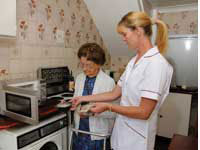
Welsh councils fear a new £50 cap on weekly community care charges will increase costs and demand for services, according to a new report.
The cap on charges for non-residential care, introduced last month, had created a “genuine anxiety” among councils that it will mean “additional pressure on budgets” that are already severely stretched, found the study, published by the Social Services Improvement Agency (SSIA).
Better Support at Lower Cost, by John Bolton, the former social care finance chief at the Department of Health, represents the findings of a year-long programme on achieving greater efficiencies in older people’s services in Wales.
Bolton, who wrote an influential paper in 2009 on how English councils can improve value for money in adult social care, warned that the £50 cap restricted Welsh councils’ ability to raise more money towards the costs of local services.
It also risked increasing demand for services, particularly from older people who were previously self-funders, and creating a perverse incentive for authorities to place more people in residential care, as they could then recoup more money in charges.
“The implication of this policy is that in Wales councils will need to be even more efficient than their English counterparts,” Bolton concluded.
The report called on Welsh councils to adopt strategies to reduce demand for residential and domiciliary care by providing people with better information and advice, and preventive support.
The study revealed that all councils were reshaping their services for older people with a shift towards more reablement and a general reduction in the numbers of older people being cared for in residential services.
However the rate of progress was mixed, and the report found that working relationships between councils and the NHS over the development and implementation of reablement services varied.
The report said that genuine partnerships with health, and the third and private sectors would be important in maximising efficiency and maintains independence for users.
SSIA said it would be taking forward work to improve efficiency in older people’s care in two pilots from 2011-12.
What do you think? Join the debate on CareSpace
Keep up to date with the latest developments in social care. Sign up to our daily and weekly emails
Related stories


 Bournemouth, Christchurch and Poole
Bournemouth, Christchurch and Poole  Hampshire County Council
Hampshire County Council  Lincolnshire County Council
Lincolnshire County Council  Norfolk County Council
Norfolk County Council  Northamptonshire Children’s Trust
Northamptonshire Children’s Trust  South Gloucestershire Council
South Gloucestershire Council  Wiltshire Council
Wiltshire Council  Wokingham Borough Council
Wokingham Borough Council  Children and young people with SEND are ‘valued and prioritised’ in Wiltshire, find inspectors
Children and young people with SEND are ‘valued and prioritised’ in Wiltshire, find inspectors  How specialist refugee teams benefit young people and social workers
How specialist refugee teams benefit young people and social workers  Podcast: returning to social work after becoming a first-time parent
Podcast: returning to social work after becoming a first-time parent  Podcast: would you work for an inadequate-rated service?
Podcast: would you work for an inadequate-rated service?  Family help: one local authority’s experience of the model
Family help: one local authority’s experience of the model  Workforce Insights – showcasing a selection of the sector’s top recruiters
Workforce Insights – showcasing a selection of the sector’s top recruiters 

 Facebook
Facebook X
X LinkedIn
LinkedIn Instagram
Instagram
Comments are closed.